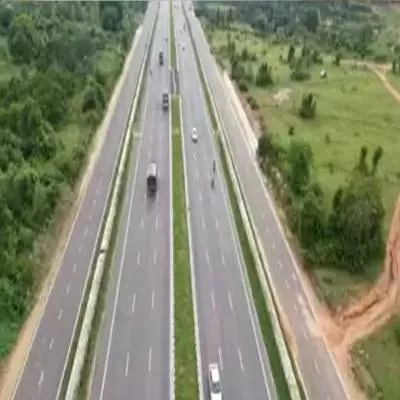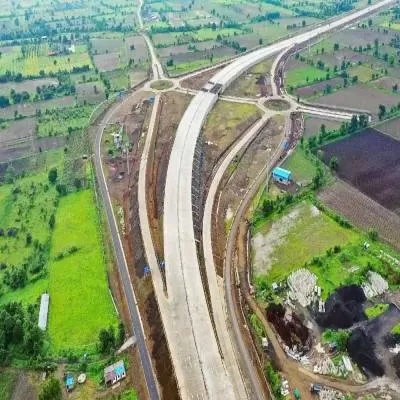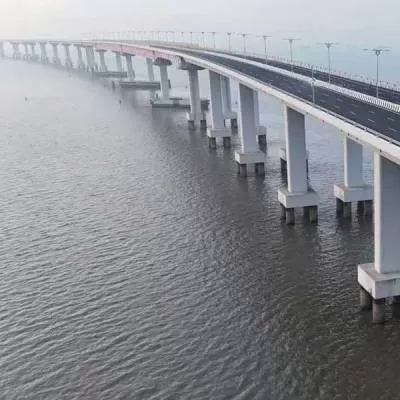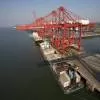- Home
- Infrastructure Transport
- ROADS & HIGHWAYS
- Mending Fences

Mending Fences
A JV operated through the partnership of government and private sector to carry out public service or a public project, the public-private partnership (PPP) plays a significant role in bringing in investments as well as efficiency in utilisation and management of resources. In essence, the private entity invests capital and assumes the inherent financial and technical risk involved in a service or project, either for a price to be paid by the public authority or the right to charge for the use of such service or project for a specified period from the ultimate consumers. Depending on the type of participation of the private entity or ownership of the relevant infrastructure, PPPs can vary. In a build-operate-transfer (BOT) project, the contractual authority selects a concessionaire to finance and construct an infrastructure facility and gives the entity the right to operate it commercially for a certain period, after which the facility is transferred to the contracting authority. And in a build-own-operate-transfer (BOOT), the private entity owns the facility and its assets until it is transferred to the contracting authority.
Causes of dispute
No matter the type of project, in India substantial sums of monies are blocked in contractual disputes in the construction sector that gradually add to the project cost. Some major factors, including incorrect design, incomplete documentation and late authority approvals, are:
- Claims for extension of time and cost compensation because of delay in performing or non-fulfilment of the initial obligations on the part of the public body, such as acquiring and handing over land for projects and providing necessary approvals.
- Ambiguity in the terms of the contract or contract conditions, poor drafting and subsequent inability on the part of the parties to agree upon the intent of the contract.
- Variations to the terms of the contract subsequent to the execution of the contract and dissatisfaction with respect to the definition and valuation of such variations.
- Inflation and price rise of raw materials, services and goods subsequent to the execution of the contract.
- Change in legislation subsequent to the execution of contract between the parties.
- Delay or termination on account of force majeure events.
- Claim for compensation or additional amounts or liquidated damages.
The engineer´s duty
Under the FIDIC (French for International Federation of Consulting Engineers) form of works contract, the role of a neutral engineer as a first-level balancer of the rights and liabilities of the parties is given due importance. Appointed by the public body, he is required to administer the contract on a daily basis but should also supervise, certify, approve actions and decide issues arising between the parties in accordance with the terms of the contract. However, in most cases, the engineer is under the control or influence of the employer and, as such, is unable to resolve the dispute in a fair and independent manner, thereby diminishing the importance of his role as a balancer of rights and liabilities.
Dispute adjudication or resolution board
When the engineer´s actions fail to resolve the dispute, it becomes necessary to refer the matter to a neutral expert body of individuals. Some contracts provide for a quasi legal body for dispute resolution between the parties such as a dispute adjudication board or dispute resolution board. The parties refer the disputes to the board, comprising people with industry experience, and, in most cases, hearings are held in a manner similar to arbitral hearings with very limited procedural formality and adherence to the principles of natural justice. Where the recommendations of the board are accepted by the parties, they become final; on rejection, the dispute is referred to arbitration. It is, therefore, felt that the time and resources devoted in the proceedings before the board could rather have been spent on arbitral proceedings, where matters are resolved with greater finality and backed by statute.
For the need of specialised project knowledge (involving technology, finance, economics and others), the statutory law has provided for arbitration as an alternative mode of dispute resolution. The Indian Parliament enacted the Arbitration and Conciliation Act in 1996 (A&C Act), making elaborate provisions for conciliation of disputes arising out of legal relationship, whether contractual or not, and to all proceedings relating thereto. Most contracts in the present day contain an arbitration clause whereby the parties agree to submit all disputes arising in relation to the contract executed by and between them to arbitration for the resolution of disputes. However, in most cases, in a PPP contract, the arbitrator to be appointed in case of a dispute is already named in the contract executed by and between the parties and is generally an employee of the public-sector entity.
Validity of a named arbitrator
The validity of appointment of a pre-named arbitrator, who is either an employee or an officer of one of the parties (generally the public body), can be examined with the help of the following judicial pronouncements:
In Amar Chand Lalitkumar vs Shree Ambika Jute Mills Ltd (AIR 1966 SC 1036), the Supreme Court held that any person may be appointed as an arbitrator, even if he is personally acquainted with the subject-matter of the reference or has an interest and, if this fact is known to both parties, it is no objection to his appointment.
In Chief Engineer, Madras Zone, MES vs G Ramachandra Reddy & Co (AIR 1993 Mad 265), it was held that the court cannot be called upon to appoint an independent arbitrator on the ground of bias only because the person designated in the agreement was an employee of the company against whom the arbitration was sought. This judgement was also followed in Ghaziabad Development Authority vs Elnique Construction (AIR 1997 All 341).
In Maheshwari Engineers & Associates vs Union of India (AIR 2000 AP 57), it was held that where the parties voluntarily agreed through tender documents for appointment of arbitrator to be named by a designated authority, a subsequent plea by the party that the arbitrator so appointed was under the influence of the appointing authority was not tenable.
In Punjab Agricultural University vs Associates Construction ((2003) 3 RAJ 431 (P&H)), it was held that where the agreement itself specifies the arbitrator, it is obligatory upon the court, should it decide to refer the matter, to refer it only to the arbitrator named in the agreement. It is not open to the court to ignore such an arbitration clause and appoint another person as an arbitrator. The challenge as to his lack of independence or impartiality can be presented before him under S 16 of A&C Act.
In Superintending Engineer, SRBC vs Srinivasa Constructions Ltd (AIR 2004 NOC 148 (AP)), it was held that where under the agreement, the appointment was to be made by the chief engineer or managing director, there could be no finding of bias against him only for the fact that he was an employee of one of the parties.
In ACE Pipeline Contracts Pvt Ltd vs Bharat Petroleum Corporation Ltd (AIR 2007 SC 1764), the Supreme Court held that once a party has entered into an agreement with eyes wide open, it cannot wriggle out of the situation on the contention that the designated person being an officer of the other side would not be impartial or objective. It further observed that where, however, the feeling is that the arbitrator has not acted independently or impartially or he suffers from bias, it would be open to the party to make an application under Section 34 of A&C Act for setting aside his award.
In Denel (Proprietary Ltd) vs Government of India, Ministry of Defence ((2012) 2 SCC 759), the Supreme Court held that the independence of the arbitrator being in question and reasonable grounds having been shown, it is not mandatory for the chief justice or any person or institution designated by him to appoint the named arbitrator or arbitrators as held by the Supreme Court in Northern Railway Administration, Ministry of Railway, New Delhi vs Patel Engineering Company Ltd.
Conclusion
Although PPP is the need of the hour as it is beneficial to both the public and private entities, the mechanism provided must facilitate the expeditious resolution of the dispute. Parties may consider referring the dispute to arbitration directly without resorting to the first two tiers of dispute resolution to save both time and resources.
About the Author:
Aradhana Bhansali, Partner, Rajani, Singhania & Partners Mumbai, mostly handles the real estate and trusts related practice of the firm. With an experience of 12 years, Bhansali has a wealth of experience in handling real estate transactions and a number of cases pertaining to civil litigation and arbitration.
- Aradhana Bhansali
- Rajani
- Singhania
- FIDIC
- PPP contracts
- JV
- Government
- Private Sector
- BOT
- BOOT
- Indian Parliament
- Arbitration
- Conciliation Act 1996
- Amar Chand Lalitkumar
- Shree Ambika Jute Mills Ltd
- MES
- G Ramachandra Reddy & Co
- Ghaziabad Development Authority
- Elnique Construction
- Maheshwari Engineers & Associates
- Union of India
- Arbitrator
- Punjab Agricultural University
- Associates Construction
- A&C Act
- SRBC
- Srinivasa Constructions Ltd
- ACE Pipeline Contracts Pvt Ltd
- Bharat Petroleum Corporation Ltd
- Denel (Proprietary Ltd
- Government of India
- Ministry of Defence
- Supreme Court
- Northern Railway Administration,Ministry of Railway
- New Delhi
- Patel Engineering Company Ltd
Aradhana Bhansali, Partner-Rajani, Singhania and Partners gives us an insight into dispute resolution in FIDIC-based PPP contracts. A JV operated through the partnership of government and private sector to carry out public service or a public project, the public-private partnership (PPP) plays a significant role in bringing in investments as well as efficiency in utilisation and management of resources. In essence, the private entity invests capital and assumes the inherent financial and technical risk involved in a service or project, either for a price to be paid by the public authority or the right to charge for the use of such service or project for a specified period from the ultimate consumers. Depending on the type of participation of the private entity or ownership of the relevant infrastructure, PPPs can vary. In a build-operate-transfer (BOT) project, the contractual authority selects a concessionaire to finance and construct an infrastructure facility and gives the entity the right to operate it commercially for a certain period, after which the facility is transferred to the contracting authority. And in a build-own-operate-transfer (BOOT), the private entity owns the facility and its assets until it is transferred to the contracting authority. Causes of dispute No matter the type of project, in India substantial sums of monies are blocked in contractual disputes in the construction sector that gradually add to the project cost. Some major factors, including incorrect design, incomplete documentation and late authority approvals, are: Claims for extension of time and cost compensation because of delay in performing or non-fulfilment of the initial obligations on the part of the public body, such as acquiring and handing over land for projects and providing necessary approvals. Ambiguity in the terms of the contract or contract conditions, poor drafting and subsequent inability on the part of the parties to agree upon the intent of the contract. Variations to the terms of the contract subsequent to the execution of the contract and dissatisfaction with respect to the definition and valuation of such variations. Inflation and price rise of raw materials, services and goods subsequent to the execution of the contract. Change in legislation subsequent to the execution of contract between the parties. Delay or termination on account of force majeure events. Claim for compensation or additional amounts or liquidated damages. The engineer´s duty Under the FIDIC (French for International Federation of Consulting Engineers) form of works contract, the role of a neutral engineer as a first-level balancer of the rights and liabilities of the parties is given due importance. Appointed by the public body, he is required to administer the contract on a daily basis but should also supervise, certify, approve actions and decide issues arising between the parties in accordance with the terms of the contract. However, in most cases, the engineer is under the control or influence of the employer and, as such, is unable to resolve the dispute in a fair and independent manner, thereby diminishing the importance of his role as a balancer of rights and liabilities. Dispute adjudication or resolution board When the engineer´s actions fail to resolve the dispute, it becomes necessary to refer the matter to a neutral expert body of individuals. Some contracts provide for a quasi legal body for dispute resolution between the parties such as a dispute adjudication board or dispute resolution board. The parties refer the disputes to the board, comprising people with industry experience, and, in most cases, hearings are held in a manner similar to arbitral hearings with very limited procedural formality and adherence to the principles of natural justice. Where the recommendations of the board are accepted by the parties, they become final; on rejection, the dispute is referred to arbitration. It is, therefore, felt that the time and resources devoted in the proceedings before the board could rather have been spent on arbitral proceedings, where matters are resolved with greater finality and backed by statute.




















